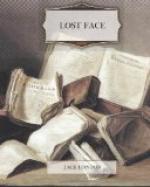That was in midsummer. In the fall of the year, the W. H. Willis started up the Yukon with two hundred homeward-bound pilgrims on board. Among them was Churchill. In his state-room, in the middle of a clothes-bag, was Louis Bondell’s grip. It was a small, stout leather affair, and its weight of forty pounds always made Churchill nervous when he wandered too far from it. The man in the adjoining state-room had a treasure of gold-dust hidden similarly in a clothes-bag, and the pair of them ultimately arranged to stand watch and watch. While one went down to eat, the other kept an eye on the two state-room doors. When Churchill wanted to take a hand at whist, the other man mounted guard, and when the other man wanted to relax his soul, Churchill read four-months’ old newspapers on a camp stool between the two doors.
There were signs of an early winter, and the question that was discussed from dawn till dark, and far into the dark, was whether they would get out before the freeze-up or be compelled to abandon the steamboat and tramp out over the ice. There were irritating delays. Twice the engines broke down and had to be tinkered up, and each time there were snow flurries to warn them of the imminence of winter. Nine times the W. H. Willis essayed to ascend the Five-Finger Rapids with her impaired machinery, and when she succeeded, she was four days behind her very liberal schedule. The question that then arose was whether or not the steamboat Flora would wait for her above the Box Canon. The stretch of water between the head of the Box Canon and the foot of the White Horse Rapids was unnavigable for steamboats, and passengers were transhipped at that point, walking around the rapids from one steamboat to the other. There were no telephones in the country, hence no way of informing the waiting Flora that the Willis was four days late, but coming.
When the W. H. Willis pulled into White Horse, it was learned that the Flora had waited three days over the limit, and had departed only a few hours before. Also, it was learned that she would tie up at Tagish Post till nine o’clock, Sunday morning. It was then four o’clock, Saturday afternoon. The pilgrims called a meeting. On board was a large Peterborough canoe, consigned to the police post at the head of Lake Bennett. They agreed to be responsible for it and to deliver it. Next, they called for volunteers. Two men were needed to make a race for the Flora. A score of men volunteered on the instant. Among them was Churchill, such being his nature that he volunteered before he thought of Bondell’s gripsack. When this thought came to him, he began to hope that he would not be selected; but a man who had made a name as captain of a college football eleven, as a president of an athletic club, as a dog-musher and a stampeder in the Yukon, and, moreover, who possessed such shoulders as he, had no right to avoid the honour. It was thrust upon him and upon a gigantic German, Nick Antonsen.




